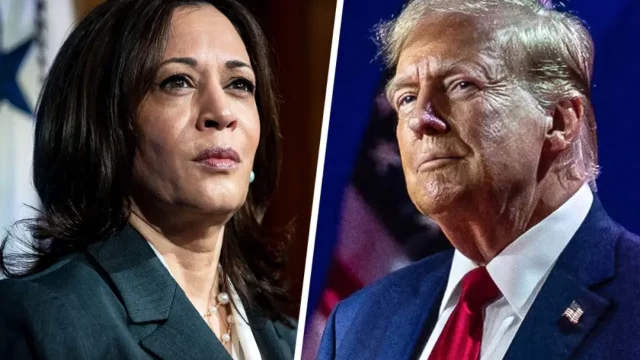Estimated reading time: 4 minutes
Kamala Harris’s entry into the presidential race has given a shot in the arm to Democratic voters, who are now expressing near-record enthusiasm levels, fresh polling data shows.
While the figures from Gallup indicate rising enthusiasm among all voters – including Republicans – over the past five months, comparative figures show a much steeper increase among Democrats – indicating that Harris’s replacement of Joe Biden as presidential candidate is the likely driving factor.
The surging enthusiasm coincides with an improved general polling performance from Harris compared with Biden, who dropped out of the race last month after a poor debate performance that threatened to further depress his already stagnant numbers in survey match-ups against Donald Trump.
A fresh Reuters/Ipsos poll released on Thursday showed Harris leading Trump nationwide by 45% to 41% – a margin consistent with other surveys since last week’s boisterous Democratic national convention in Chicago that confirmed the US vice-president’s status as the nominee.
Harris’s figures since then have generally enhanced the small leads that she had accrued since her elevation to the top of the Democratic ticket in July, suggesting that her standing has been further boosted by the traditional post-convention bounce that presidential candidates customarily receive.

The effect of Robert F Kennedy Jr’s decision to suspend his independent presidential campaign and endorse Trump this week is unclear, since the Reuters/Ipsos and other recent surveys were still being conducted at the time of his announcement on 23 August. The Trump campaign claims the endorsement will boost the former president’s chances, even though Kennedy’s once-buoyant poll numbers had declined to about 5% before he pulled out.
But it is the state of play in certain key battleground states that will decide the outcome of the 5 November election and here, too, Harris is showing a marked improvement over Biden before he left the race.
A Fox News poll on Thursday showed the vice-president with narrow leads in three out of four southern Sun belt states; 48 to 47% in Arizona, and 48 to 46% in both Georgia and Nevada. In the fourth, North Carolina – which Trump won by just 1.4% in 2020 – the Republican nominee was ahead by a single point, 48 to 47%.
The poll represented a big jump on recent numbers recorded by Biden, who trailed Trump by six points in Georgia in April and by five points in Nevada and Arizona as late as June.
It also triggered an angry reaction from Trump’s campaign, which lambasted the figures in a statement reflecting the stakes.
“It’s that time of year again. Fox is releasing atrocious polling,” the campaign said. “President Trump continues to outperform polling from past cycles.”
The statement claimed Trump’s current support level was higher in Arizona, Nevada and North Carolina than at the equivalent point in the 2020 election, which he ultimately lost to Biden.
Varying polls show the candidates neck and neck in three other crucial swing states, Pennsylvania, Michigan and Wisconsin, sometimes misleadingly called the Rust belt.
In these knife-edge contests, Harris will hope to be helped by the newfound enthusiasm for her candidacy among the Democratic base, which according to the Gallup survey, outstrips that felt by Republican voters for Trump and may be an extra spur to voters to go to the polls.
About 78% of Democratic voters told Gallup’s pollsters that they felt enthusiastic about voting with Harris heading the party ticket, a dramatic leap from the 55% who said the same last March when Biden was the candidate, at a time when misgivings about his age were already commonplace.
GOP voter enthusiasm for Trump in the same period has shown a more modest rise, from 59 to 64%.
“Democrats and Democratic-leaning independents are largely driving the surge in enthusiasm nationally,” Gallup’s Jeffrey M Jones wrote in a commentary explaining the new figures.
Democrats’ current enthusiasm levels, Jones went on, are just one point short of Gallup’s 21st-century high for the group, which was 79% in February 2008 when Barack Obama and Hillary Clinton were joined in a battle for the party’s presidential nomination.
High motivation does not necessarily mean Harris will win, however, since Trump’s followers, too, are enthusiastic. What it may guarantee is a high turnout.
“As a result of elevated election thought and enthusiasm in both parties, voter participation could surpass what it was in 2020, when two-thirds of eligible US adults cast ballots, the highest in over 100 years,” Jones concluded.
The Guardian



































